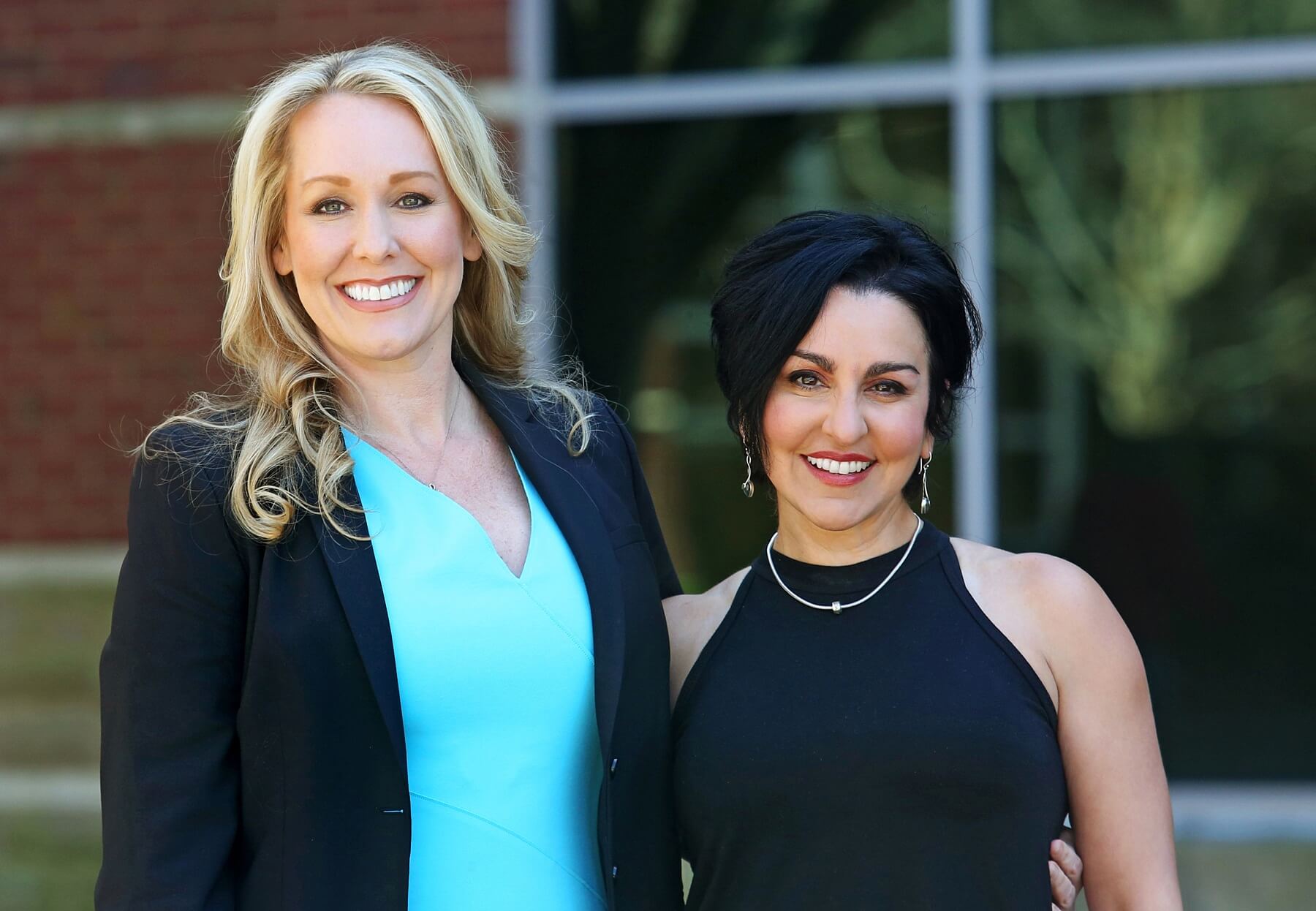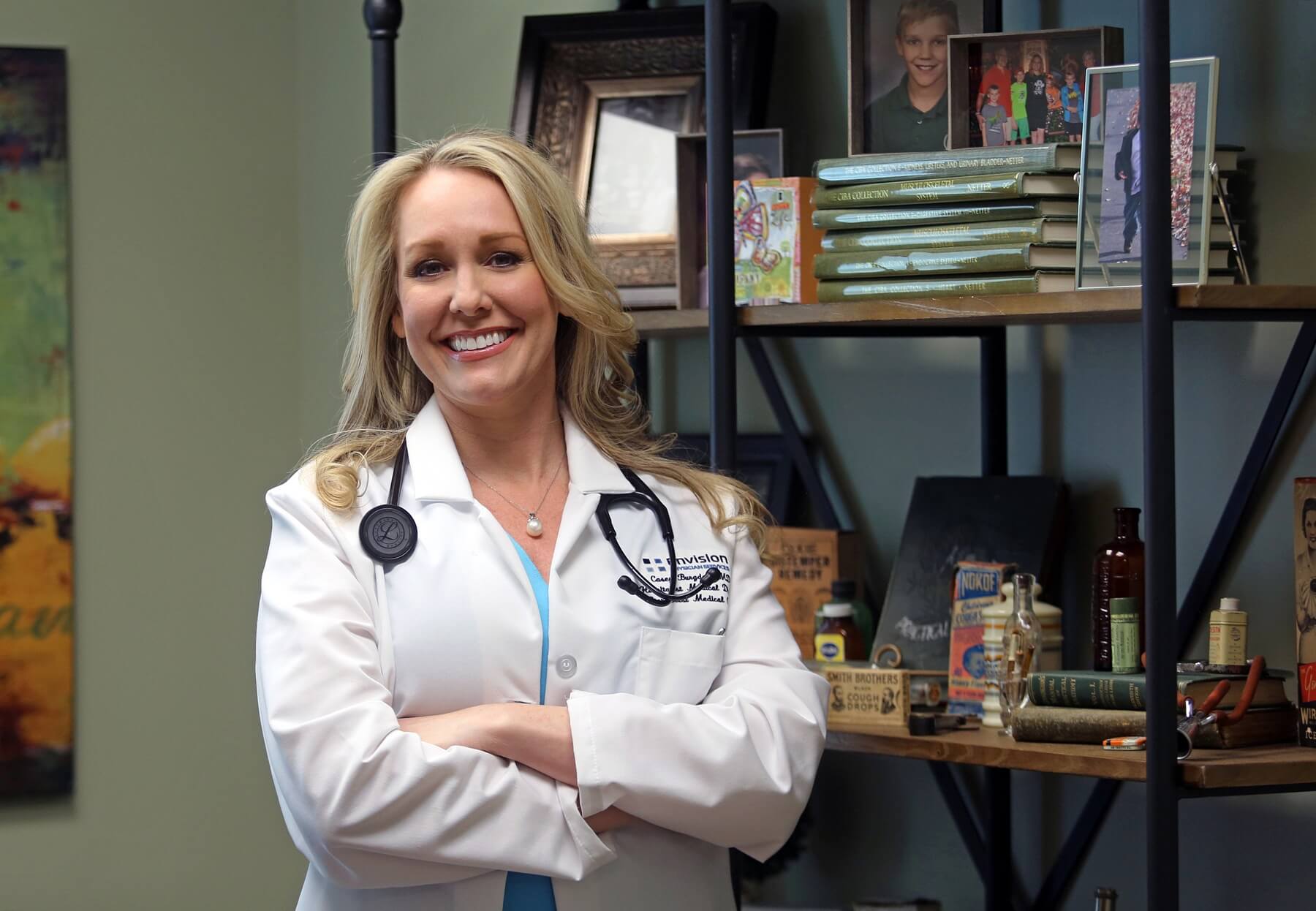In every industry, women are rising in the ranks and establishing their position in leadership roles. At TriStar StoneCrest Medical Center two female physicians are in leadership positions over the medical staff, for the first time ever. With Dr. Gina Hamrang as Chief of Staff and Dr. Casey Burgdorf as Chief of Staff Elect and Hospitalist Program Director, StoneCrest continues to be a place devoted to quality care. These women contribute a tremendous ability to maintain the growth and standard of service at the Smyrna, Tennessee hospital.
Dr. Hamrang was born to two healthcare professionals, her father is an OBGYN and her mother is an RN. A professor of obstetrics and gynecology, Dr. Hamrang’s father inspired her career in the field. Her love of medicine and surgery was fostered at an early age. During her first delivery of a baby, she knew she had found her calling in obstetrics and gynecology. After training at hospitals across the country, Dr. Hamrang fortuitously found herself in Nashville and quickly fell in love with the city — and the TriStar family. A physician wife, mother and avid marathon runner, Dr. Hamrang’s offerings and talents are diverse and significant to our community.
Mississippi born, Dr. Burgdorf began working in a hospital in her late teens, as an emergency room technician. Thanks to mentors, support from her community and a scholarship to the University of Mississippi School of Medicine, Dr. Burgdorf was able to continue on the path of becoming a physician. She worked as an associate professor in medicine and a hospitalist and emergency room technician before moving to Nashville and honing her focus in internal medicine. For 10 years, she and her family have called Tennessee home.
Get to know these inspiring leaders!

What are your responsibilities in your current positions?
GH: I am very fortunate to work in concert with the administration and the physicians as Chief of Staff. I am the communication between everybody — that is my main job. We are continually improving our processes and quality.
CB: As Chief of Staff Elect, I am chairperson of the credentialing committee, which comes with a lot of responsibility. Physicians, nurse practitioners and physicians assistants apply for privileges to practice medicine or perform surgeries here, and I oversee the committee that reviews those applicants. We verify that they are competent, well-trained, experienced individuals who will be taking care of our patients.
As program director of the hospitalist program, my primary role is to provide on-site management and leadership. I am the primary liaison between the hospitalist group, StoneCrest and TriStar administration and the StoneCrest medical staff. I work closely with the hospital administration to solve problems, improve efficiency, create a professional atmosphere conducive to a high standard of patient care and interact with all the physician chairpersons of the different departments. I also work closely with the hospital to review, revise and create hospital policies as the need arises.
Why is it important to have women represented at this level of leadership?
GH: The face of medicine is changing. When I went to medical school, I was in the school’s first medical school class that had more women graduating than men. For me, that was the beginning of a change in medicine. There are so many female providers now — nurse practitioners, CRNAs, physicians assistants and physicians, and there are more women in leadership positions, including women as leaders of countries. It makes perfect sense for women to be in leadership roles more than they have been in the past.
CB: Inherently, all genders have the qualities of a leader. In today’s world, it is plainly evident that women can excel in any profession and position. Having women in the position of leadership in a hospital and over the medical staff allows the playing field to be even. At this hospital I have never encountered a physician or administrator who didn’t believe that women are just as capable as a man. I feel respected here and that, in turn, encourages me to be a better leader … because they have elected me to this role. I am determined not to let anyone down.


What impact do you hope to have on the future of TriStar StoneCrest?
GH: I want StoneCrest to continue to be the place it has been, where we all work together and make our patients feel happy and comfortable. I would like to be known for getting more physicians engaged at the committee and leadership levels. I want more physicians to interact with nursing and administration and to take ownership over the processes here. We have a lot of great, involved physicians but it is a small list, and I want that list to get bigger.
CB: Our hospital is growing. We recently doubled the size of our emergency room. We are adding beds to the ICU; we will soon have to add floors and medical beds. Our patient population in our area is booming. Just last year, Murfreesboro and Smyrna were listed as the second and third fastest growing cities in Tennessee. We have a responsibility to provide quality patient care for these people. I am excited to be part of that growth and implement new processes in order to keep up with the pace of our community.
What are some of the challenges you face in your position?
GH: The biggest challenge is to explain to other physicians why we have processes in place. Our processes improve the quality and standards of care and I want to convey that there is a reason we have them.
CB: For all physicians, female physicians in particular, it is difficult to maintain a good work/life balance. Although the number of medical students is now almost half female and half male, there has been very little change for women in terms of domestic tasks and responsibilities. From providing clinical care to patients, the ever-growing paperwork and computer time to my role as a medical leader for my group and the hospital, it is especially hard to juggle that many hats. I am also a perfectionist, so if I am going to do something, I want to be satisfied with the result and know I did my very best. With a physician husband and four children, I have a whole other job at home.


When you aren’t working, where can we find you?
GH: Running or hiking along the roads and highways of Tennessee or on a trail somewhere. I have done more than 50 official marathons and ultra marathons. The count right now is at 59, and the furthest distance I have done is 100 miles. If I get to the starting line of the Vol State 500k, I will do 314 solo miles across the state of Tennessee.
CB: To be honest, it is usually catching up on housework, kids’ homework and activities, and the never-ending pile of laundry. I love to cook, and I feel a sense of pride when the six of us gather around the table with the TV off with my family enjoying my food and asking for seconds. When the sun is out, I enjoy hiking and walking the parks around our area. A great day would be coffee with a dear friend, getting exercise outside and lying on a blanket in the sunshine with a good book with the sounds of nature all around me … then coming home to a miraculously clean house.
What advice do you have to women establishing their career in healthcare?
GH: One thing my father always told me is that it is really easy to become a doctor, but becoming a whole human being is hard. You can still have your identity as a woman. To quote my father again, he said women can do all the things men can do and more because as mothers we have a unique ability. It is important for women to know that you can have both. You may have to get creative, but you can do both.
CB: Remember my four Ps: purpose, prioritize, ponder and plan ahead.
Purpose: Your work and where you work has to matter. If you feel like your time doesn’t give you a strong sense of purpose, it is time to change your current position and place.
Prioritize: Women physicians got where they are because they are smart, work hard and exhibit tremendous stamina. Usually, we are overachievers, type A and perfectionists. Sometimes, we can’t be all things to all people. What matters most is your and your family. It is okay to say no to people.
Ponder: You have to take time to yourself and just think. I have had to learn to stop and listen and think.
Plan ahead: When my kids were little, and my husband was starting his practice, I never had time to plan anything for me. I can’t stress enough how important it is to find a good female physician mentor. I searched for one for the majority of my career. Two years ago, I was fortunate to have met Dr. Tama Van DeCar, an accomplished military veteran, anesthesiologist, a mother and currently our chief medical officer of the entire TriStar division. Her guidance and perspective in medical leadership as well as being a wife and a mother has been very helpful for me. In any role in medicine, finding someone who you can identify with and can give you meaningful advice is essential.
Thank you to these two inspiring healthcare leaders. To learn more about TriStar Stonecrest Medical Center, visit TriStarStonecrest.com. And thank you to Leila Grossman of Grannis Photography for the beautiful photos.
This article is sponsored by TriStar Health.



















